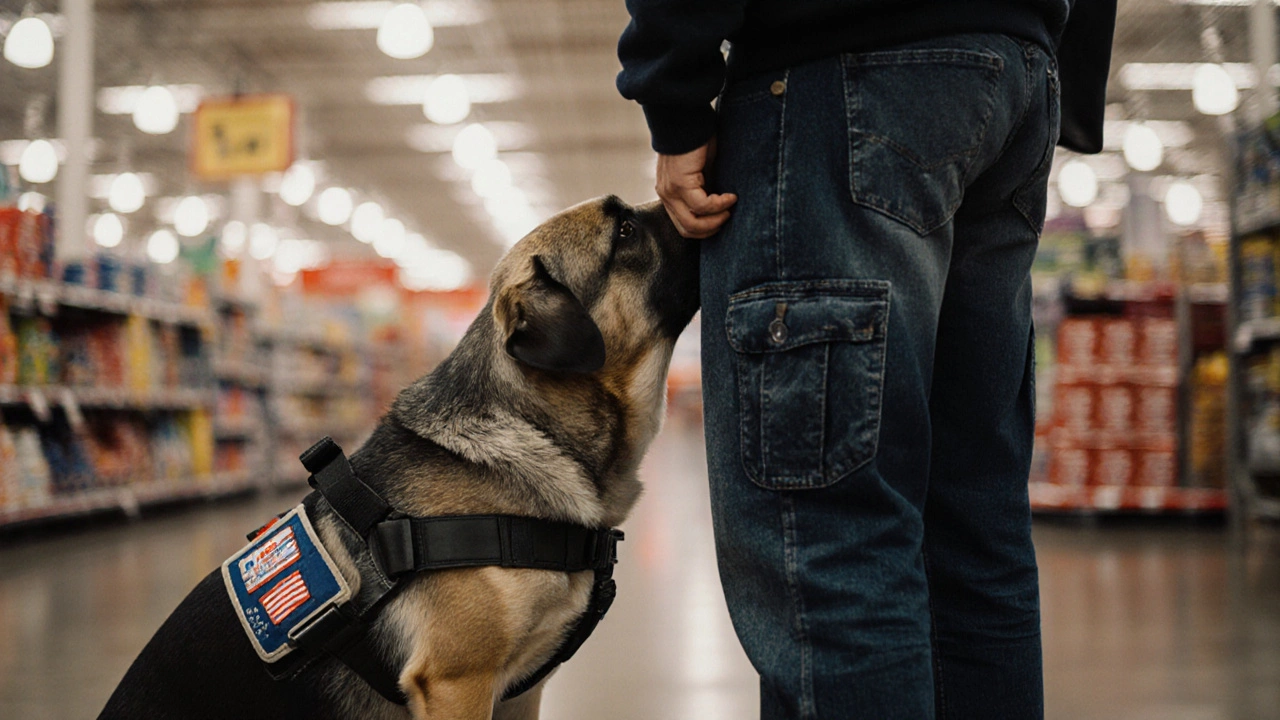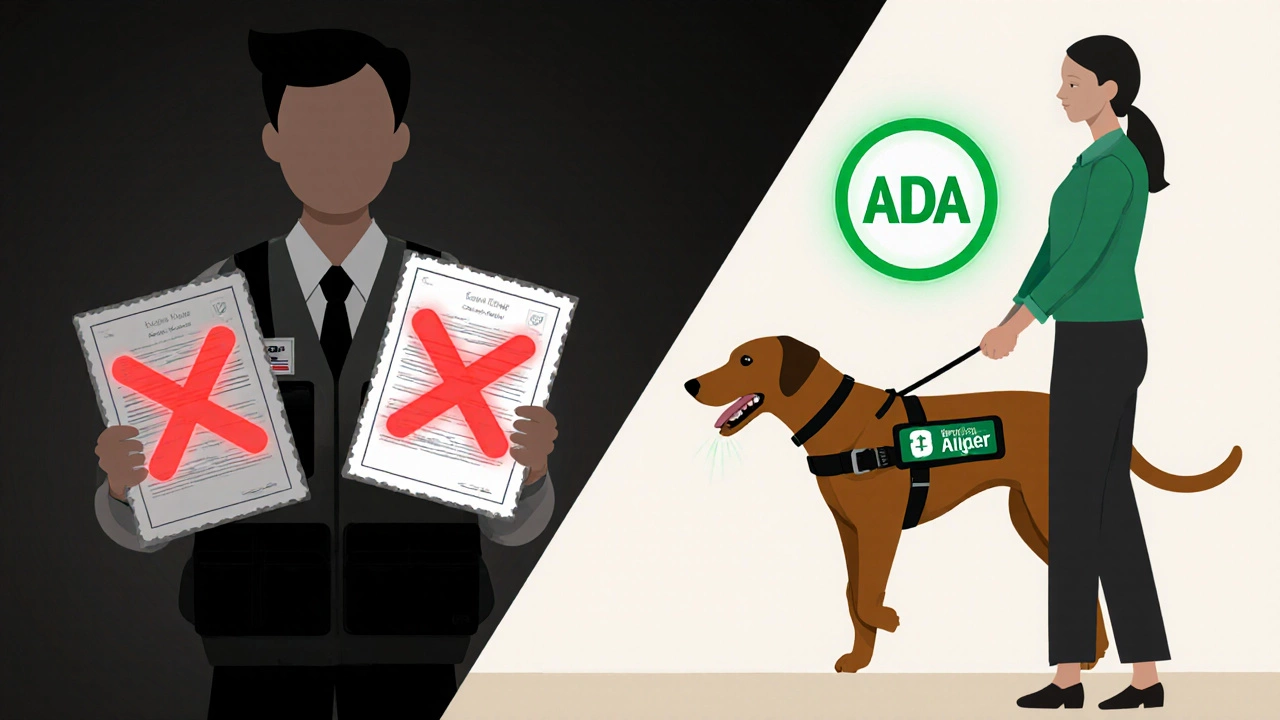Service Dog Compliance Checker
Is Your Dog ADA-Compliant?
Check if your dog qualifies as a service animal under the Americans with Disabilities Act (ADA) based on trained tasks and behavior.
Result
- Emotional support animals and pets are not protected
- Businesses can only ask two questions about your dog
- No certification or ID is required
- You don't need to disclose your disability
Ever walked into Costco with your dog and been asked, "Is this a service dog?"? You’re not alone. Many people assume that bringing a dog into a store like Costco is either always allowed or always forbidden-but the truth is more nuanced. And if you’re relying on your dog for daily tasks because of a disability, you need to know exactly what Costco can and can’t ask you. The answer isn’t about store policy. It’s about federal law.
What the ADA Says About Service Dogs
The Americans with Disabilities Act (ADA) is the law that protects your right to bring a service dog into public places-including Costco, grocery stores, restaurants, and airports. Under the ADA, a service dog is defined as a dog that has been individually trained to do work or perform tasks for a person with a disability. That could be guiding someone who is blind, alerting someone to a seizure, retrieving dropped items, or providing pressure therapy during panic attacks.The key word here is trained. Emotional support animals, therapy dogs, and pets don’t count under the ADA. Only dogs trained for specific disability-related tasks do. And that training doesn’t need to come from a professional program. A person can train their own dog. What matters is the task, not the paperwork.
What Costco Can and Cannot Ask
Costco, like every other business open to the public, must follow ADA rules. That means they’re allowed to ask only two questions:- Is this dog required because of a disability?
- What work or task has the dog been trained to perform?
That’s it. They cannot ask for:
- Proof of certification or training documents
- Details about your disability
- Proof of vaccination records
- Proof of breed or size
- To see the dog perform the task on the spot
They also can’t charge you extra fees, deny you entry, or isolate you in a separate area because of your dog. If they try, they’re breaking federal law.
Some Costco employees may not know this. You might get pushback from a cashier, a greeter, or even a manager who’s been told by corporate to "only allow service animals." That’s not how the law works. The ADA doesn’t require you to prove anything beyond those two simple questions. And if an employee insists on more, they’re misinformed-not you.
Why People Get Confused
The confusion usually comes from two places: fake service dog claims and inconsistent training among retail staff.First, there are websites selling fake service dog vests, ID cards, and certificates for $50. These are meaningless under the law. No federal agency issues service dog certifications. No national registry exists. So if someone shows you a plastic card that says "Certified Service Dog," it’s just a marketing gimmick. Costco can’t accept or reject it because it has no legal weight.
Second, Costco employees aren’t trained on the ADA. Most have never read the law. They’re taught to follow store policy, which often says "no pets." So when they see a dog, their first instinct is to say no. That’s why you might get asked more than two questions-or even be turned away.
That doesn’t mean you’re wrong. It means the employee is wrong. And you’re not required to argue. You can calmly say, "I’m protected under the ADA. I’m only required to answer two questions. Is there someone who can help me with this?" Most stores will call a manager who’s been trained-or at least has Google access.
What If Your Dog Isn’t Fully Trained?
If your dog is still learning tasks or isn’t fully reliable in public, you’re not protected under the ADA. That’s not a loophole-it’s a safety rule. Service dogs must be under control and housebroken. If your dog barks constantly, lunges at people, or has accidents, the business can ask you to remove it.That’s different from asking you to prove your dog’s status. It’s about behavior. A well-behaved dog that’s still in training can still be denied access if it’s disruptive. But if your dog is calm, quiet, and doing its job-like alerting you to low blood sugar or guiding you through crowded aisles-you’re covered.

Real-Life Scenarios
Here’s what actually happens when people bring service dogs to Costco:- Case 1: A veteran with PTSD brings his trained dog to Costco. The greeter asks, "Is this a service dog?" The veteran says yes. The greeter asks, "What does it do?" The veteran says, "It wakes me up during nightmares and blocks people if I’m having a panic attack." The greeter nods and lets them in. No ID, no paperwork.
- Case 2: A woman with a mobility impairment brings her dog that pulls her wheelchair. A manager says, "We don’t allow dogs unless they’re service animals." She replies, "It’s a service dog. It helps me move around." The manager asks no more questions. She shops without issue.
- Case 3: A man walks in with a small dog in a vest. He’s asked the two ADA questions. He says the dog "gives me comfort." The employee says, "I’m sorry, but that’s not a service dog under the ADA." The man leaves. He wasn’t lying-he just didn’t understand the difference between emotional support and service.
The difference? Tasks vs. comfort. One is protected. The other isn’t.
What to Do If You’re Denied
If you’re turned away despite answering the two ADA questions correctly, here’s what to do:- Stay calm. Don’t argue with the employee. They’re not the problem.
- Ask to speak with a manager or store supervisor.
- If they still refuse, say: "I’m filing a complaint with the Department of Justice under the ADA. I’d like the store’s name and address for the complaint."
- Take a photo of the store sign (if allowed) and note the date, time, and names of staff involved.
- File a complaint at ada.gov (you can do this anonymously).
Thousands of complaints are filed every year. Costco, like all major retailers, takes these seriously. They train their staff better after a complaint. Your experience helps protect others.
What You Can Bring Into Costco
Only service dogs are allowed. That means:- ✅ Trained service dogs-yes
- ❌ Emotional support animals-no
- ❌ Therapy dogs-no
- ❌ Pets-no
- ✅ Service dogs in training (if under your control)-yes, but only if the store allows it
Some stores may allow dogs in training as a courtesy, but they’re not required to. Costco’s official policy doesn’t mention it, so don’t assume. Stick to service dogs if you want guaranteed access.

How to Prepare for Your Next Trip
To avoid hassle:- Make sure your dog is well-behaved in public. Practice quiet walking, ignoring distractions, and staying near your side.
- Know the two ADA questions. Practice your answers out loud.
- Don’t wear a vest or carry fake ID. It invites suspicion and doesn’t help.
- Bring a small notebook with your dog’s tasks written down-just in case you need to explain them clearly.
- Know your rights. You don’t owe anyone an explanation beyond those two questions.
The goal isn’t to fight. It’s to walk in, shop, and leave without a second thought. That’s your right.
Service Dog Myths Debunked
Let’s clear up the biggest lies you’ve heard:- Myth: You need a certificate. Truth: No federal agency issues them. They’re scams.
- Myth: Only guide dogs count. Truth: Any dog trained for a disability-related task counts-psychiatric, mobility, diabetic alert, seizure response, and more.
- Myth: Costco has its own rules. Truth: They must follow federal law. Their internal policy can’t override the ADA.
- Myth: You have to prove your disability. Truth: You don’t. Not even a doctor’s note.
- Myth: Small dogs aren’t real service dogs. Truth: Size doesn’t matter. A 6-pound dog can be trained to alert to seizures or low blood sugar.
Can Costco ask for proof that my dog is a service dog?
No. Costco cannot ask for certification, training documents, ID cards, or proof of vaccination. Under the ADA, they’re only allowed to ask two questions: whether the dog is required because of a disability and what task it’s trained to perform. Anything else is a violation of your rights.
What if my dog is still in training?
If your dog is still learning tasks and isn’t fully reliable in public, it’s not yet protected under the ADA. Service dogs must be trained to perform specific tasks and behave appropriately in public settings. Some stores may allow dogs in training as a courtesy, but Costco is not required to. Wait until your dog can reliably do its job before bringing it into stores.
Can Costco deny entry if my dog is wearing a vest?
No. A vest doesn’t grant legal rights, and it doesn’t give Costco permission to deny access. If your dog is a trained service dog, you’re protected regardless of what it’s wearing. Conversely, if your dog isn’t a service dog, a vest won’t make it one. The law looks at the dog’s function, not its outfit.
Are emotional support animals allowed at Costco?
No. Emotional support animals provide comfort but are not trained to perform specific tasks related to a disability. The ADA does not protect them in public spaces. Costco, like all businesses, can legally refuse entry to emotional support animals-even if they’re well-behaved.
What if I’m asked more than two questions?
If you’re asked for more than the two ADA-approved questions, you can politely say, "I’m protected under the ADA. I’m only required to answer those two questions." If the employee persists, ask to speak with a manager. If you’re still denied, document the incident and file a complaint with the Department of Justice. Many stores improve their training after a complaint.
Final Thought
You’re not asking for special treatment. You’re asking for your legal right to be treated the same as anyone else. Service dogs aren’t pets. They’re medical equipment-like a cane or a wheelchair. And just like you wouldn’t be asked to prove you need a cane to enter a store, you shouldn’t be asked to prove you need a service dog.Costco doesn’t get to decide what your disability looks like. The law already did. And if you know your rights, you’ll walk in with confidence-and leave with your groceries, your dog, and your dignity intact.
